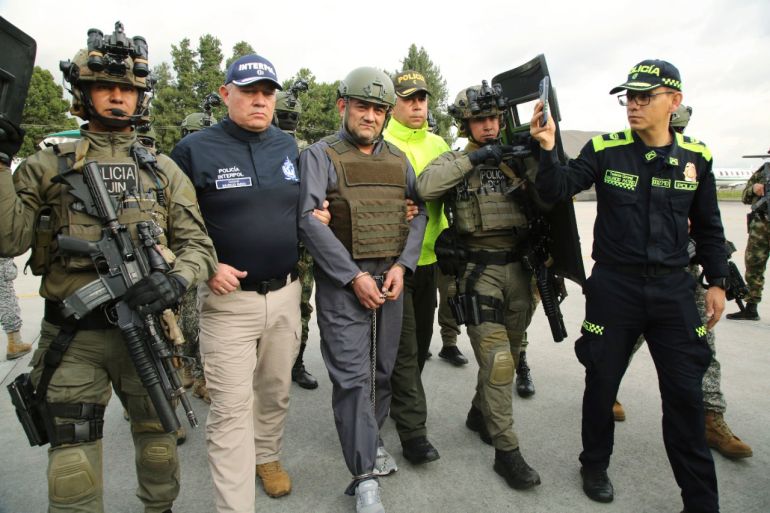Otoniel shipped ‘outrageous’ amounts of cocaine to US: Prosecutor
The accused Colombian drug trafficker pleads not guilty to two charges after being extradited to the US from Bogota.

One of Colombia’s most notorious drug traffickers shipped “outrageous quantities of cocaine” into the United States, a top US prosecutor has said, a day after Dairo Antonio Usuga was extradited to face charges in New York.
Usuga, better known as Otoniel, is “one of the most dangerous, most wanted drug kingpins in the world” who once had as many as 6,000 “henchmen” under his command, Breon Peace, the US attorney for the Eastern District of New York, told reporters on Thursday.
Keep reading
list of 3 itemsColombia to extradite Otoniel to the US as soon as possible
Colombia extradites drug lord ‘Otoniel’ to the United States
“He earned enormous profits, measured in billions, not millions,” Peace said. “Today he will finally face justice.”
Otoniel pleaded not guilty through his lawyer, Arturo Hernandez, to two charges of engaging in a continuing criminal enterprise and conspiring to manufacture and distribute cocaine. Prosecutor Gillian Kassner said the government would not move forward with a third charge over firearms use.
Hernandez did not challenge his client’s detention, but disputed Kassner’s claim that the danger of releasing Otoniel “cannot be overstated”.
“We certainly don’t agree with their evaluation,” Hernandez said.
Colombian authorities captured Otoniel in October last year after a massive military operation.
President Ivan Duque said at the time that his arrest marked “the biggest blow against drug trafficking in our country this century”, only comparable to the fall of infamous drug lord Pablo Escobar.
Duque also welcomed Otoniel’s extradition to the US as a moment of triumph for “legality, the rule of law, the security forces and justice”.
On Wednesday afternoon, a convoy of five bulletproof police vehicles transported Otoniel from a prison in the capital, Bogota, to a military airport, where he was handed over to US Drug Enforcement Administration (DEA) officials.
The Gulf Clan operates in 12 of Colombia’s 32 provinces, and counts some 3,800 members, according to information provided by the country’s national police.
It is also involved with illegal mining, and the government accuses the group of threatening and killing community leaders across the country.
Otoniel has long been a fixture on the DEA’s most-wanted list.
He was first indicted in 2009 in Manhattan federal court on narcotics charges and for allegedly providing assistance to a far-right paramilitary group designated a terrorist organisation by Washington.
Later indictments in Brooklyn and Miami federal courts accused him of importing into the US at least 73 metric tonnes of cocaine between 2003 and 2014 through countries including Venezuela, Guatemala, Mexico, Panama, and Honduras.
The US made a formal request for his extradition in late November, just weeks after he was captured in the northern Uraba region, a key drug route.
Colombia’s high court dismissed a petition from a group of Otoniel’s victims who argued that his extradition would violate their rights to justice and reparation and demanded he first face the more than 128 proceedings against him in Colombia.
Duque said that from the US, Otoniel would continue collaborating with the Colombian authorities in the investigations against him and once he completes his sentences for drug trafficking, he will return to “Colombia to pay for the crimes he committed”.
The extradition comes just weeks after former Honduran President Juan Orlando Hernandez was extradited to the US to face drug trafficking and weapons charges of his own.